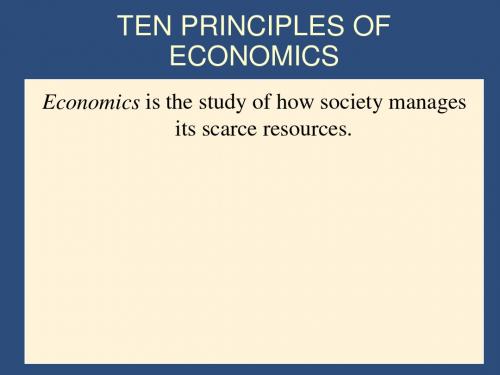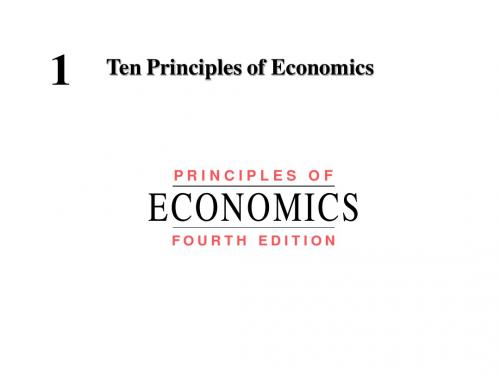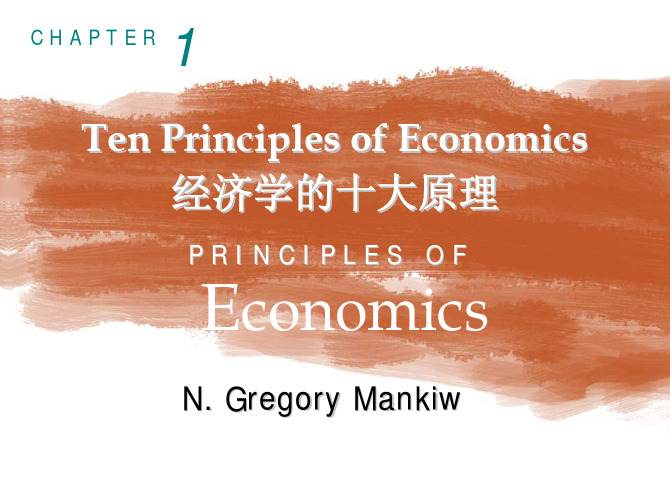市场经济原理学十大原理The principles of Economics(PPT 16页)
西方经济学曼昆 PPt 经济学十大原理

二、经济学的研究内容 1.人们如何做出决策? 2.个人决策如何影响他人?人们 怎样交易? 3.所有决策和相互交易共同组成 “经济”,影响整个经济的力量 和趋势如何。
三、经济学十大原理 1、人们面临权衡取舍
资源稀缺性要求人们做出选择。“鱼和 熊掌不可兼得”人们将在稀缺资源的多种用 途中进行权衡比较,根据自己的各种需要的 强弱缓急做出选择,找出对自己最有利的配 置方法。如个人的选择:安排时间、金钱 社会的选择:“大炮与黄油”、效率 (efficiency)与平等(equity)、保护环境与 增加收入
5、贸易能使每个人状况更好
竞争各方相互贸易,每个人、 竞争各方相互贸易,每个人、每个国家可 以专门从事自己最擅长的活动,通过交易,人 以专门从事自己最擅长的活动,通过交易, 们可以按较低的成本获得各种各样的物品和劳 务。
6、市场通常是组织经济活动的一种好方法
社会不同的选择和资源配置方式决定了不同的 经济制度。市场经济(market economy)和计划经 济差别: *决策机制不同:前者由市场参与者分散、自 主决策。后者由至高无上的中央计划机关决策 *协调机制不同:前者用价格协调千千万万的决 策,后者有金字塔形的等级体系,用自上而下的 命令方式贯彻决策,保证决策协调 *激励机制不同:前者以个人利益为中心,后者 以集体主义为中心
经济学的十大原理

Principle #6: Markets Are Usually a Good Way to Organize Economic Activity. • A market economy is an economy that allocates resources through the decentralized decisions of many firms and households as they interact in markets for goods and services.
Principle #4: People Respond to Incentives. • Marginal changes in costs or benefits motivate people to respond. • The decision to choose one alternative over another occurs when that alternative’s marginal benefits exceed its marginal costs!
Principle #3: Rational People Think at the Margin. • Marginal changes are small, incremental adjustments to an existing plan of action.
People make decisions by comparing costs and benefits at the margin.
Principle #8: The Standard of Living Depends on a Country’s Production. • Almost all variations in living standards are explained by differences in countries’ productivities. • Productivity is the amount of goods and services produced fபைடு நூலகம்om each hour of a worker’s time.
经济学原理十大原理

经济学原理十大原理一、市场机制调节供求市场机制调节供求即依赖于市场供求关系来调节商品和服务的生产和流通量。
当供应比需求多时,价格下降;反之当供应比需求少时,价格上升。
二、“边际理论”边际理论是市场经济中使用最多的经济学理论之一,它主张通过增加或减少价值来提高收益。
它的基本原理是:当一个单位的收入增加时,不一定会提高总收入,而是依赖于收入增加的多少。
三、最优分配原理最优分配原理是指公平、合理地将利益和责任分配给各个效益者。
在各个权利和义务之间,应该找到最优的分配方式,即将利益最大化,以满足任何组织的目的。
四、消费者利益最大化原理消费者利益最大化原理是指消费者经济行为的基本原则,即追求获得最大利益。
也就是说,消费者在购买时,应该把利益最大化作为决定因素,以达到最大收益的目的。
五、经济发展与社会经济结构调整原理经济发展与社会经济结构调整原理是指通过社会结构调整,不断扩大国民收入和经济发展,满足人民群众各项需求的原则;也就是说,要取得经济发展的有效成果,必须重视社会结构的调整和重组。
六、利润最大化原理利润最大化原则是指企业行为的基本原则,即企业追求获得最大的利润,通过价格、产出、市场结构等管理策略,将收益最大化。
七、最低成本原理最低成本原理是企业行为的基本原则,即企业在生产货物或提供服务时,应当尽可能降低成本,以便降低价格经营招揽客户,以壮大企业产业利润。
八、利用经济技术进步原理利用经济技术进步原则是指keep利用最新的经济技术进步,不断改善生产设备环境,增加产量,获得最大的收益和效益的原则。
九、环境保护与社会发展原理环境保护与社会发展原则是指充分尊重自然环境,发展和维护社会适应环境变化的原则;也就是说,在环境保护和社会发展时,应当科学地处理经济发展和社会进步之间的关系,建立起可持续发展的经济体系。
十、资源有效利用原理资源有效利用原则是指合理配置资源,尽可能提高资源的使用效率,更节约地满足人民群众的需求。
经济学十大原理

CHAPTER 1 TEN PRINCIPLES OF ECONOMICS
9
HOW PEOPLE MAKE DECISIONS
Principle #3: Rational People Think at the Margin
例如:
当一个经理在考虑是否要增加产出
时, 她会在增加的劳动力与原材料 的成本和额外的收益之间进行比较
1
Ten Principles of Economics
PRINCIPLES OF
ECONOMICS
FOURTH EDITION
In this chapter, look for the answers to these questions:
What kinds of questions does economics
市场(Market) : a group of buyers and sellers
(need not be in a single location)
组织经济活动意味着需要决定 生产什么 怎么生产 生产多少 谁将得到它们
CHAPTER 1 TEN PRINCIPLES OF ECONOMICS
17
HOW PEOPLE INTERACT
Principle #6: Markets Are Usually A Good Way to Organize Economic Activity
市场经济:许多企业和家庭在物品和劳务市
场上相互交易,通过他们的分散决策来配置 资源的经济
In a market economy, these decisions
1、经济学十大原理

原理5:贸易能使每个人状况更好
• 双赢
小试牛刀:你的室友做饭比你好,但你清 扫房间比你的室友快。 如果你的室友承担全部做饭工作,你承担 全部清扫工作,这比你们平均分摊每一项工作 时你要花费的时间多了,还是少了? 专业化和贸易如何使两个国家的状况变得 更好。
原理6:市场通常是组织经济活动的一 种好方法 invisible hand
资源配置 资源利用
相对稀缺的经济资源如何分配给不同的用途 充分利用现有资源和提高资源的使用效率
不同的经济体制实现资源配置和资源利用的方式不同
计划经济
市场经济
混合经济
原理7:政府有时可以改善市场结果
• 市场失灵 market failure
– 外部性(externality):一个人的行为对 旁观者福利的影响 – 市场势力(market power):一个经济活 动者对市场价格有显著影响的能力
首先,你的室友可能会认为你很体贴,并 因此提高对你的评价; 其次,即便是你所服务的人不认为这是美 德的表现,而将之视为一项投资,那么遵循等 价交换的原则,在适当的场合下,他也必定会 为之付出某种程度的报酬。
这种情况,民间叫做“顺水人情”,本 小利大,何乐而不为呢?
固定占座人 ——发挥相对优势使交易群体获利
下面运用经济学原理对占座行为的合 理性予以分析。 1. 占座——理性人的选择 2.替他人占座——理性人考虑边际量 3.固定占座人——发挥相对优势使交易群 体获利 4.座位轮换制——另一种制度设计的优劣
占座——理性人的选择
“占座”意味着什么?意味着你可以拥有令 你满意的座位,可以不必伸长脖子穿过重重障碍捕 捉老师的每一个动作,每一个眼神,可以不必端起 眼镜费神地辨认黑板上的板书,可以不必伸长耳朵 生怕漏听了什么,而这一切都意味着当你和你的同 学同样用心时,你比他们更容易集中精神,获得更 好的听课效果,最终得到更优异的成绩,而这一切 都仅仅是因为你占了个好座位。
经济学十大原理

systematically and purposefully do the best they can to achieve their objectives. make decisions by evaluating costs and benefits of marginal changes – incremental adjustments to an existing plan.
TEN PRINCIPLES OF ECONOMICS
10
HOW PEOPLE MAKE DECISIONS
Principle #2: The Cost of Something Is Principle #2: The Cost of Something Is What You Give Up to Get It What You Give Up to Get It
TEN PRINCIPLES OF ECONOMICS
13
人们如何做出决策
原理三: 理性人考虑边际量 原理三: 理性人考虑边际量
理性人: 系统而有目的地尽最大努力实现其目标的人 通过比较成本与利益的边际变动来做出决策 边际变动 – 对现有行动计划的微小增量调整
TEN PRINCIPLES OF ECONOMICS
TEN PRINCIPLES OF ECONOMICS
2
经济学研究什么问题
稀缺性: 社会资源的有限性 经济学: 研究社会如何管理自己的稀缺资源, 比如: 人们决定购买什么, 工作多长时间,储蓄多少, 消费多少 企业决定生产多少,雇佣多少工人 社会决定如何在国防,消费物品,环境保护和其 他需求之间分配资源
16
TEN PRINCIPLES OF ECONOMICS
Chap_01Ten Principles of Economics经济学十大原理共65页PPT资料
Why do we study economics?
Understand the way the world works: An useful perspective to explain various events, including economic policies
Develop rational thinking, guiding us to make correct individual decision
经济一词来源于希腊语,意思 是“管理家庭的人”。
A household and an economy face many decisions:
一个家庭和经济体面临很多决策:
Who will work? 谁去工作?
What goods and how many of them should be produced? 应该生产什么物品?应该生产多少?
Make consistent judgments on economic phenomena
Basic knowledge for our major of business and economics
What Is Economics Like Interesting economics: idea Boring economics: technique Useful economics: Alan Greenspan, the chairman of the Fed
Economics 经济学
Society and Scarce Resources: 社会和稀缺资源:
The management of society’s resources is important because resources are scarce. 因为资源是稀缺的,所以社会资 源的管理就很重要。
经济学的十大原理(PPT 36张)
对现有行动计划的微小增量调整incremental
adjustments to an existing plan
经济学十大原理
14
人们如何做出决策
原理三: 理性人考虑边际量
例如:
一个大学生考虑是否要多上一年学
会比较学费加上损失的工资和多上一年学所增加 的额外收入
一个经理考虑是否要增加产出
8
2.人们如何做出决策
2.人们如何做出决策
原理一: 人们面临权衡取舍 People Face Tradeoffs 所有决策都面临着权衡取舍。比如:
期末考试前一天晚上看韩剧意味着更少的
时间学习
想要更多的收入需要工作更长时间,这就
使得休息时间减少
保护环境意味着生产消费物品的资源减少
经济学十大原理
10
人们如何做出决策
原理一: 人们面临权衡取舍
社会面临一种重要的权衡取舍:
效率efficiency vs. 平等 equality 效率: 社会能从其稀缺资源中得到的最大利 益
平等: 经济成果在社会成员中平均分配 权衡取舍:为使社会更加平等, 需要在富人
与穷人之间重新分配收入。但这会减少工作 与生产的激励,并缩小经济“蛋糕”的规模
B 很多国家的政府喜欢给公务员加薪,而不愿意
把更多的钱用来救济穷人,为什么?
按照经济学的方式思考:
任何决策都应基于比较收益和成本的基础上 然而,经济学规则不能用来进行价值判断。
经济学十大原理
5
博物经济学
为什么牛奶盒是方的,可乐瓶是圆的?
为什么所有取款机(哪怕是安装在高速路边的取
A.你认为近来股票市场的状况如何?股票会
不会涨?你觉得那一种股票比较好呢?
经济学十大原理 英文
The Ten Principles of EconomicsEconomics is a social science that studies how individuals, businesses, and governments make decisions regarding the allocation of scarce resources to satisfy their unlimited needs and wants. Through a systematic analysis of economic behavior, economists have formulated several principles that underpin the study of economics. These principles help us understand how the economy operates and how individuals and societies make economic choices. Here are the ten fundamental principles of economics:Principle 1: People Face Trade-offsIndividuals face trade-offs due to limited resources. A person can only allocate their time, money, and energy to certain activities, which necessitates sacrificing others. For example, a student must choose between studying for an exam and going out with friends. Similarly, governments face trade-offs when allocating their budgets between defense, healthcare, education, and other areas.Principle 2: The Cost of Something is What You Give Up to Get ItMaking decisions always involves considering opportunity costs. Opportunity cost refers to the value of the next best alternative that is forgone when making a choice. For instance, if you choose to spend your money on a new smartphone, the opportunity cost is the vacation you could have taken instead. Understanding opportunity costs is essential for making rational decisions.Principle 3: Rational People Think at the MarginRational decision-making involves weighing the marginal benefits against the marginal costs. The marginal benefit is the additional benefit derived from consuming or producing one more unit of a good or service, while the marginal cost is the additional cost of producing or consuming that unit. Rational individuals make decisions by comparing these marginal benefits and costs.Principle 4: People Respond to IncentivesIncentives play a crucial role in economics. An incentive is anything that influences the behavior of individuals or firms. People respond to incentives in predictable ways. For example, when the price of a product increases, consumers tend to buy less of that product. Understanding incentives helps predict how people will react to changes in prices, taxes, subsidies, or regulations.Principle 5: Trade Can Make Everyone Better OffTrade allows individuals and countries to specialize in what they do best, leading to increased productivity and overall welfare. By specializing in their comparative advantage and engaging in trade, individuals can consume a greater variety of goods and services at a lower opportunity cost. Trade allows for the efficient allocation of resources and can make everyone involved better off.Principle 6: Markets Are Usually a Good Way to Organize Economic ActivityMarkets have proven to be effective in organizing economic activity. The interaction of buyers and sellers in a market determines prices and quantities. Prices serve as signals to individuals and firms, guiding them on how to allocate resources. Markets also encourage competition, leading to efficiency and innovation. However, there are cases where markets may fail to allocate resources efficiently, such as when there are externalities or monopoly power.Principle 7: Governments Can Sometimes Improve Market OutcomesGovernments intervene in the economy to address market failures and promote the general welfare. They enforce property rights and contracts, provide public goods and services, and regulate market activities. Additionally, governments aim to correct market failures caused by externalities, information asymmetry, or natural monopolies. However, government intervention can also lead to unintended consequences and inefficiencies if not carefully implemented.Principle 8: A Country’s Standard of Living Depends on Its Ability to Produce Goods and ServicesProductivity is the key driver of a nation’s standard of living. Countries with high levels of productivity can produce more goods and services per unit of input. Productivity growth is essential for sustained improvements in living standards over time. Factors that contribute to productivity growth include investments in physical and human capital, technological advancements, and efficient institutions.Principle 9: Prices Rise When the Government Prints Too Much MoneyInflation is primarily caused by the excessive growth of the money supply. When the government prints more money, the value of money decreases, leading to higher prices. Inflation erodes the purchasing power of individuals and businesses, distorts price signals, and hampers economic stability. Central banks play a key role in managing the money supply and controlling inflation.Principle 10: Society Faces a Short-Run Trade-off between Inflation and UnemploymentThe Philips curve illustrates the short-run trade-off between inflation and unemployment. In the short run, policies that aim to reduce unemployment may lead to higher inflation, and policies that aim to decrease inflation may result in higher unemployment. This trade-off highlights the challenges faced by policymakers in balancing price stability and low unemployment rates.These ten principles provide a foundation for understanding the complexities of economics. By applying these principles, economists can analyze economic behavior, develop models, and make predictions about the effects of policy changes. Understanding these principles is not only important for economists but also for individuals, businesses, and policymakers in making informed decisions to improve economic outcomes.。
十大经济原理
十大经济原理
1.比较优势原理:不同个体在生产某种商品或服务上的优势比较,可以实现资源的最优配置和效益的最大化。
2.需求和供给原理:市场经济下,需求和供给的相互作用决定了商品和服务的价格和数量。
3.稀缺性原理:资源有限,而需求是无限的,因此必须在资源有限的条件下做出选择,以满足最重要或最紧迫的需求。
4.机会成本原理:进行某种经济活动时,放弃的最高价值的替代选择所带来的成本。
5.边际效应原理:每次增加一单位的投入(如劳动、资金)或消费一单位的产出时,所带来的额外效益或成本。
6.货币中性原理:一国货币供应的增加并不会对实际经济产出产生持续影响,而只是导致价格上涨。
7.市场失灵原理:市场机制并非总能有效地分配资源,可能会出现市场失灵、外部性等问题。
8.资本积累原理:积累更多的资本(物质和非物质)可以增加生产力和经济发展。
9.货币贬值原理:货币贬值会导致物价上涨,但对于出口和旅游业来说有利。
10.需求弹性原理:价格变动对商品和服务需求量的敏感程度,影响着市场供求关系、定价和营销策略的制定。
- 1、下载文档前请自行甄别文档内容的完整性,平台不提供额外的编辑、内容补充、找答案等附加服务。
- 2、"仅部分预览"的文档,不可在线预览部分如存在完整性等问题,可反馈申请退款(可完整预览的文档不适用该条件!)。
- 3、如文档侵犯您的权益,请联系客服反馈,我们会尽快为您处理(人工客服工作时间:9:00-18:30)。
LA Laker 的篮球明星 Kobe Bryant 选择放弃上大学, 从高中直接进入职业球队 ,因此他可以赚到成百上 千万美元。
来自 中国最大的资料库下载
Copyright © 2004 South-Western/Thomson Learning
Copyright © 2004 South-Western/Thomson Learning
原理7: Governments Can Sometimes Improve Market Outcomes 政府有时能够改善市场结果. • Market failure may be caused by 市场失灵有 可能是由以下原因引起:
原理3:
理性人进行边际思考
• 边际变动 (Marginal changes) 是对现有行动计划所作出的少量、渐进式的 调整.
人们通过比较边际成本和收益作出决策
People make decisions by comparing costs and benefits at the margin.
来自 中国最大的资料库下载
Copyright © 2004 South-Western/Thom们会对激励作出反应
• Marginal changes in costs or benefits motivate people to respond. • 成本或收益的边际变化促使人们作出反应 • The decision to choose one alternative over another occurs when that alternative’s marginal benefits exceed its marginal costs!
• People gain from their ability to trade with one another. • 人们从他们相互交易的能力中获益 • Competition results in gains from trading. • 竞争产生来自交易的收益 • Trade allows people to specialize in what they do best. • 交易允许人们就自己最擅长的方面进行专业 分工。
• an externality, which is the impact of one person or firm’s actions on the well-being of a bystander.
resources through the decentralized decisions of many firms and households as they interact in markets for goods and services.市场经济是一种通过许多企业和 家庭的分散决策配置资源的经济,与此同时企业和 家庭在商品和服务市场上发生相互作用。 • Households decide what to buy and who to work for. • 家庭决定要购买什么和谁去工作 • Firms decide who to hire and what to produce. 来自 中国最大的资料库下载 • 企业决定雇佣谁和生产什么
Copyright © 2004 South-Western/Thomson Learning
原理6: Markets Are Usually a Good Way to Organize Economic Activity. 市场通常是组织经济活动的良好方式
• Adam Smith made the observation that households and firms interacting in markets act as if guided by an “invisible hand.”
• 当市场未能有效地配置资源时,市场失 灵就出现了。
• When the market fails (breaks down) government can intervene to promote efficiency and equity.
• 当市场失灵(失效)时,政府可以通过 干预促进效率和公平。 来自 中国最大的资料库下载
来自 中国最大的资料库下载
Copyright © 2004 South-Western/Thomson Learning
原理6: Markets Are Usually a Good Way to Organize Economic Activity. 市场通常是组织经济活动的良好方式 • A market economy is an economy that allocates
原理7: Governments Can Sometimes Improve Market Outcomes 政府有时能够改善市场结果. • Market failure occurs when the market fails to allocate resources efficiently.
• 亚当.斯密观察到家庭和企业在市场上相互 作用,就好象有一只“看不见的手”在引导
• 因为家庭和企业在决定买卖什么时关注价格, 他们在无意中把他们行为的社会成本纳入考虑 之中 。 • 结果,引导决策者们达到倾向于使社会总体福 利 最大化的结果。
来自 中国最大的资料库下载
Copyright © 2004 South-Western/Thomson Learning
• 当替代物的边际收益超过其边际成本时,在 许多可变换方案中的选择就出现了。
来自 中国最大的资料库下载
Copyright © 2004 South-Western/Thomson Learning
原理5: Trade Can Make Everyone Better Off. 交易能够使每个人的状况都有所改善
